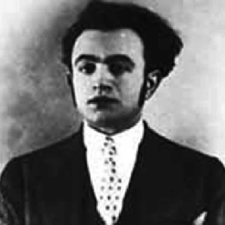 Federico De Roberto was born in Naples in January 1861 and educated at the University of Catania. Moving to the North, he began his writing career as a journalist, and through that work met Luigi Capuana and Giovanni Verga. The latter introduced him into Milan’s literary circles.
Federico De Roberto was born in Naples in January 1861 and educated at the University of Catania. Moving to the North, he began his writing career as a journalist, and through that work met Luigi Capuana and Giovanni Verga. The latter introduced him into Milan’s literary circles.
De Roberto’s first novel, Ermanno Raeli (1889), was autobiographical. After experimenting with playwriting, he again took up journalism as a literary critic for Corriere della Sera and Giornale d’Italia in Milan.
De Roberto then returned to fiction with several classic works. His second novel, L’illusione (1891) was the first of his Uzeda trilogy, which presents the saga of the noble Uzeda family of Catania, all set against the Risorgimento. This novel begins to demonstrate the keen psychological insights that would form the underlying motif of Agony. The second novel of his trilogy, I Viceré (1894), proved unsuccessful in the market. In 1895, he published the treatise, L’amore, fisiologia, psicologia, morale, revealing his intense interest in character and motivation.
De Roberto first published Agony (Spasimo) as a serial in the Corriere della Sera between November 1896 and January 1897. L’Imperio (1908–13, published by Mondadori in 1929) completed his Uzeda trilogy. In 1921 he published La paura, a vivid and pre-Existential account of trench warfare in the Valgrebbana during World War I.
In 1918, De Roberto was appointed chief of Catania’s civic library. After the death of Giovanni Verga in 1922, De Roberto devoted himself to organizing that writer’s papers with a plan to write a study of his life and works. He continued to work throughout the 1920s, republishing Ermanno Reali (in 1923), his early poetry, and his translations of French literature. De Roberto died in Catania in July 1927. Due to his disagreements with the Fascist regime, he was never publically mourned.
His considerable output also includes collections of short stories, among them La Sorte (1887) and Documenti umani (1888), letters, and verse. During his lifetime, success largely eluded his efforts, but with the posthumous publication in 1958 0f Lampedusa’s Il Gattopardo (The Leopard), De Roberto’s work was reassessed, and he now holds a prominent place in the canon of Italian literature. Leonardo Sciascia deemed De Roberto’s I Viceré the greatest Italian novel after Manzoni’s I promessi sposi.
Copyright © 2021
ITALICA PRESS, INC.